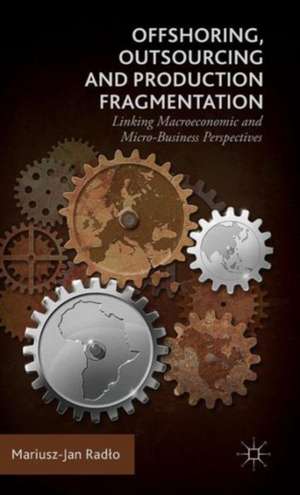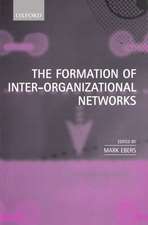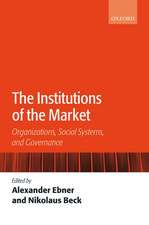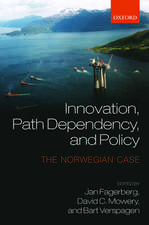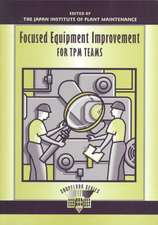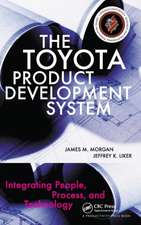Offshoring, Outsourcing and Production Fragmentation: Linking Macroeconomic and Micro-/Business Perspectives
Autor Mariusz-Jan Radłoen Limba Engleză Hardback – 4 apr 2016
Key features include a comprehensive theoretical explanation of offshoring and outsourcing at both macroeconomic and microeconomic level, as well as an explanation of practical consequences of the mentioned phenomenon for the development of the global economy, national economies, concrete industries and enterprises. Unlike other publications, which are often characterized by narrow management or a macroeconomic approach to the analysis of offshoring and outsourcing, Radlo's text offers real insight into the global impact of production fragmentation.
Preț: 640.37 lei
Preț vechi: 753.39 lei
-15% Nou
Puncte Express: 961
Preț estimativ în valută:
122.55€ • 133.07$ • 102.94£
122.55€ • 133.07$ • 102.94£
Carte tipărită la comandă
Livrare economică 22 aprilie-06 mai
Preluare comenzi: 021 569.72.76
Specificații
ISBN-13: 9781137571243
ISBN-10: 1137571241
Pagini: 216
Ilustrații: XII, 216 p.
Dimensiuni: 140 x 216 x 14 mm
Greutate: 0.42 kg
Ediția:1st ed. 2016
Editura: Palgrave Macmillan UK
Colecția Palgrave Macmillan
Locul publicării:London, United Kingdom
ISBN-10: 1137571241
Pagini: 216
Ilustrații: XII, 216 p.
Dimensiuni: 140 x 216 x 14 mm
Greutate: 0.42 kg
Ediția:1st ed. 2016
Editura: Palgrave Macmillan UK
Colecția Palgrave Macmillan
Locul publicării:London, United Kingdom
Cuprins
List of Figures
List of Tables
Acknowledgements
Introduction
PART I: OFFSHORING, OUTSOURCING, PRODUCTION FRAGMENTATION: DEFINITIONS, MEASURES AND ORIGIN OF THE RESEARCH
1.1. Introduction
1.2. Definitions and taxonomies of offshoring and outsourcing
1.3. Origin and main issues in research on offshoring and outsourcing
1.4. Measuring offshoring and outsourcing
1.5. Summary and conclusions
PART II: OFFSHORING AND OUTSOURCING IN ECONOMIC THEORIES
2.1. Introduction
2.2. Offshoring and outsourcing in neoclassical theory of the firm
2.3. Offshoring and outsourcing in the new institutional economics
2.4. Offshoring and outsourcing in light trade theory
2.5. Offshoring and outsourcing in the perspective of foreign direct investment theories
2.6. Summary and conclusions
PART III: EXPLAINING AND MODELLING OFFSHORING AND OUTSOURCING IN ENTERPRISES
3.1. Introduction
3.2. Evolution of the scope and structure of offshoring and outsourcing in enterprises
3.3. Offshoring and outsourcing in enterprises: motives and location factoors
3.4. Models offshoring and outsourcing in enterprises
3.5. Summary and conclusions
PART IV: EVOLUTIONARY VIEW OF INTERNATIONAL PRODUCTION FRAGMENTATION IN ENTERPRISES
4.1. Introduction
4.2. Case and comparative studies: data, method, results, and discussion
4.3. Industry case studies
4.4. Discussion of results
4.5. Summary and Conclusions
PART V: PRODUCTION FRAGMENTATION IN THE WORLD ECONOMY
5.1. Introduction
5.2. Main trends in trade and FDI flows
5.3. Trade in intermediate goods and intrafirm trade
5.4. Trade in services
5.5. Offshoring intensity in selected economies
5.6. Offshoring impact on employment, wages and labor productivity
5.7. Summary and conclusions
Summary and conclusions
References
List of Tables
Acknowledgements
Introduction
PART I: OFFSHORING, OUTSOURCING, PRODUCTION FRAGMENTATION: DEFINITIONS, MEASURES AND ORIGIN OF THE RESEARCH
1.1. Introduction
1.2. Definitions and taxonomies of offshoring and outsourcing
1.3. Origin and main issues in research on offshoring and outsourcing
1.4. Measuring offshoring and outsourcing
1.5. Summary and conclusions
PART II: OFFSHORING AND OUTSOURCING IN ECONOMIC THEORIES
2.1. Introduction
2.2. Offshoring and outsourcing in neoclassical theory of the firm
2.3. Offshoring and outsourcing in the new institutional economics
2.4. Offshoring and outsourcing in light trade theory
2.5. Offshoring and outsourcing in the perspective of foreign direct investment theories
2.6. Summary and conclusions
PART III: EXPLAINING AND MODELLING OFFSHORING AND OUTSOURCING IN ENTERPRISES
3.1. Introduction
3.2. Evolution of the scope and structure of offshoring and outsourcing in enterprises
3.3. Offshoring and outsourcing in enterprises: motives and location factoors
3.4. Models offshoring and outsourcing in enterprises
3.5. Summary and conclusions
PART IV: EVOLUTIONARY VIEW OF INTERNATIONAL PRODUCTION FRAGMENTATION IN ENTERPRISES
4.1. Introduction
4.2. Case and comparative studies: data, method, results, and discussion
4.3. Industry case studies
4.4. Discussion of results
4.5. Summary and Conclusions
PART V: PRODUCTION FRAGMENTATION IN THE WORLD ECONOMY
5.1. Introduction
5.2. Main trends in trade and FDI flows
5.3. Trade in intermediate goods and intrafirm trade
5.4. Trade in services
5.5. Offshoring intensity in selected economies
5.6. Offshoring impact on employment, wages and labor productivity
5.7. Summary and conclusions
Summary and conclusions
References
Notă biografică
Mariusz-Jan Radlo is an economist with experience in private, central government, and academic sectors. Since 2004, he has worked as a research fellow at the Warsaw School of Economics. Since 2009 he is a managing partner at SEENDICO in Warsaw, Poland.
Textul de pe ultima copertă
In this book, Radlo increases understanding of offshoring, outsourcing and international production fragmentation, and explains the impact of this phenomenon on the economies and enterprises.
Key features include a comprehensive theoretical explanation of offshoring and outsourcing at both macroeconomic and microeconomic level, as well as an explanation of practical consequences of the mentioned phenomenon for the development of the global economy, national economies, concrete industries and enterprises. Unlike other publications, which are often characterized by narrow management or a macroeconomic approach to the analysis of offshoring and outsourcing, Radlo's text offers real insight into the global impact of production fragmentation.
Key features include a comprehensive theoretical explanation of offshoring and outsourcing at both macroeconomic and microeconomic level, as well as an explanation of practical consequences of the mentioned phenomenon for the development of the global economy, national economies, concrete industries and enterprises. Unlike other publications, which are often characterized by narrow management or a macroeconomic approach to the analysis of offshoring and outsourcing, Radlo's text offers real insight into the global impact of production fragmentation.
